|
|
|
Former HBBL member, Sumit Vashishtha, recently defended his thesis, entitled Bayesian reinforcement learning with Dirichlet Process. Through his doctoral work at INRIA, Lille (France) under the supervision of Dr. Odalric-Ambrym Maillard, Sumit developed a provably optimal distributional framework for reinforcement learning (RL), specifically utilizing stochastic processes called Dirichlet Processes. Sumit now has his eye on using Dirichlet Processes for coordination dynamics in two-player games. Well done, Sumit! |
|
|
|
Former high school and undergraduate student Carter Sale returned to HBBL to update us on his newly completed master's in Medicine, Health and Human Sciences from Macquarie University (Sydney, Australia) . Now 19 years old, Carter recently began a PhD program at Scuola Superiore Meridionale (Naples, Italy) in Modeling and Engineering Risk and Complexity. Carter's research integrates coordination dynamics and ecological psychology with machine learning and computational modeling to understand how coordinated behavior emerges. This work aims to build more robust artificial agents that can coordinate with, adapt to, and mirror human behavior in real-world, dynamic environments. |
|
Continued talks at dinner. From left to right: Scott Kelso, Carter Sale, Amaury Dechaux, Aliza Sloan. |
|
|
|
UKRI's Engineering and Physical Sciences Research Council approved a joint proposal entitled Translational Neurotechnology Research Partnership: Understanding goal directed behavior and skill learning to create robust Brain~Computer Interfaces (BCIs) with funding of £1.8 million ($2.4 million)—beginning January 2026 for 4 years. This Center-to-Center collaboration is unique given the combination of expertise and experience of the three centers involved, building on ongoing collaborations between University of Bath’s Institute for the Augmented Human (directed by Prof of Neurotechnology and Turing AI Fellow, Damien Coyle), the National Center for Adaptive Neurotechnologies (Albany, NY, directed by Prof of Neurology, Jon Wolpaw), and Florida Atlantic University’s Human Brain and Behavior Lab (directed by FAU’s Eminent Scholar in Science, and Prof of Complex Systems, Scott Kelso). |
|
|
The project is also supported by University College Dublin, Royal United Hospitals, Ekso Bionics, NeuroCONCISE, and Bath’s Centre for the Analysis of Motion, Entertainment Research and Applications (CAMERA). These worldclass partners will establish a new international initiative to advance our understanding of how skill learning unfolds across the lifespan, from infancy to adulthood, and in the contexts of rehabilitation and assistive BCI - a type of neuroprosthetic that can create a communication link between the external device and the brain's electrical activity to augment or restore sensory-motor functions. The vision is to make BCI-based skills as reliable as natural muscle-based skills, and this requires a deeper understanding of motor skill learning and development mechanisms and disorders thereof. The research has 3 interrelated foci: one with infants, one on adults learning to control virtual/prosthetic arms and hands, and one on people with stroke. FAU’s contribution builds on HBBL's work which combines advanced motion capture, artificial intelligence (AI), and the approach of Coordination Dynamics in baby studies to develop a better understanding of neural correlates of skill learning and the emergence of agency in infants. The FAU team will also develop and test a baby-BCI that can aid functional diagnosis and personalized, dynamic rehabilitation in neurodevelopmental disorders. |
|
Left to right: Dr. Amaury Dechaux, Sarah Kavanagh, Prof. Scott Kelso, Dr. Aliza Sloan |
|
Consul General of Ireland, Sarah Kavanagh, visited HBBL on November 25th, 2025 to discuss complex systems, the human brain, and fellow Irishman, prof. Scott Kelso's contributions to science, including HBBL's current investigations into human agency. Watch more here.
|
|
|
Dr. Amaury Dechaux presents! |
|
If my body functions as a pure mechanism according to the Laws of Nature, what is this ‘I’? ~ E. Schrödinger, What is Life?, 1944 “What is this ‘I’?” . How do we get a window into this profound question? One idea (pursued here) would be to look at the difference between spontaneous events (sometimes viewed as 'unconscious') and intentional events (those that involve conscious effort). Phase transitions in bimanual coordination afford a possible paradigm. Here, we compare the participants’ behavior when instructed to let those transitions happen (Let-Go) versus when they are instructed to resist them ("Hold-On") Our investigations suggest that the nature of Schrödinger’s ‘I’ is both deterministic and stochastic. Click here to view the poster. |
|
|
A new article, The Motionable Mind: How physics (dynamics) and life (movement) go(t) together, reconsiders the common assumption in models of human coordination that fluctuations arise due to externally generated 'noise'. Based on a rich set of experimental and theoretical work, Kelso explores how special boundary conditions give rise to order parameter fluctuations and posits that intentions are actually hidden in these fluctuations. Click here to read more.
|
|
Former PhD students and postdocs at HBBL and CCS, Mengsen Zhang (left), Guillaume Dumas (center), and Julien Lagarde (right) - now professors at Michigan State, Université de Montréal, and University de Pau and Pays de l'Adour, respectively - were invited to speak at the same international conference on team and multi-agent dyamics! They are doing the College of Science and FAU proud.
|
|
|
|
Two recent articles from colleagues at University of Tokyo expand upon HBBL's model of infant behavior and agency formation and explore individual differences in the infant~mobile paradigm. Click here to read about their insights into infant learning and memory through modeling. Click here to learn about individual differences in early purposeful behavior.
|
|
Left to right: Aliza Sloan, Scott Kelso & Amaury Dechuax |
|
Dr. Amaury Dechaux joins the HBBL team through the FAU College of Science Jumpstart Postdoctoral Fellowship program. Amaury earned his doctorate from University of Montpellier for developing co-adaptive interactive systems under the direction of Prof. Ganesh Gowrishankar and Prof. Julien Lagarde —himself an HBBL alumnus. Dr. Dechaux is an expert in ad-hoc coordination processes applied to interactive systems and is excited to join the HBBL as a jumpstart postdoc to probe into the processes underlying the emergence and maintenance of agency. Current work includes the study of the interactions between spontaneous and intentional dynamics in adults performing bimanual coordination tasks as well as the identification of dynamical and neural signatures of agentic discovery - the "Aha moment" - in newborns. |
|
Over the course of 15 years, with direct support from the National Science Foundation, Pier-Giorgio Zanone and Scott Kelso published 3 papers (a trilogy, see below) on the coordination dynamics of human skill learning in the “gold standard” journal of its time, the Journal of Experimental Psychology: Human Perception and Performance. It was therefore a great surprise to learn that the first of these (Zanone and Kelso, 1992) –according to Research Gate—was the second-most-read research item in that Journal last week! (see announcement)
Trilogy on Human Skill Learning Zanone, P. G., & Kelso, J. A. (1992). Evolution of behavioral attractors with learning: nonequilibrium phase transitions. Journal of Experimental Psychology: Human perception and performance, 18(2), 403. Zanone, P. G., & Kelso, J. S. (1997). Coordination dynamics of learning and transfer: collective and component levels . Journal of Experimental Psychology: Human Perception and Performance, 23(5), 1454. Kelso, J. A. S., & Zanone, P. G. (2002). Coordination dynamics of learning and transfer across different effector systems. Journal of Experimental Psychology: Human Perception and Performance , 28 (4), 776. Bonus! Click here for a review of the trilogy . |
|
Point Break was a daylong event organized by TedxDelrayBeach devoted to self-organized change in nature and community. As an invited speaker, Dr. Kelso explained how brain, mind, individuals and societies are all playing the coordination game on a field largely made up of coexisting tendencies.
|
|
Over a period of many years, Prof. Scott Kelso and his colleagues at FAU developed a theory of behavioral and brain coordination dynamics (CD). In CD, an entirely new dynamical regime of brain and behavioral function was discovered called metastability --from the Latin ‘meta’ (beyond) and ‘stabilis’ (able to stand)--in which individual brain regions exhibit tendencies to function autonomously at the same time as they exhibit tendencies to bind together. The brain’s synergistic function is thus proposed to rely on a subtle blend of simultaneous integration and segregation, not merely one or the other. Now, in a large international collaboration led by Fran Hancock and colleagues at King’s College London, a landmark article in Nature Reviews Neuroscience clarifies the concept of metastability, summarizing evidence of metastability in the brain, and delineating some practical implications of metastability for mental health, aging, TBI, anesthesia and prematurity. In the article, metastability, a foundational concept of CD, is proposed as a key signature of healthy brain and mental function. Read the article here. |
|
Either/or thinking is a major stumbling block to human development and understanding. In this book J.A. Scott Kelso & David A. Engstrøm offer a whole new way of looking at the world, awakening a “sixth sense” that people didn’t realize they had:
the squiggle sense. Nature's contraries are perceived not only as opposing polar states, but as coexisting complementary tendencies, symbolized by the squiggle (~). The squiggle sense is grounded in coordination dynamics, the science of coordination in complex systems (including the human brain).
Use this book to nudge your brain~mind into its metastable mode again and again, to better perceive the complementary dances of contraries, and to transcend the detrimental narrow-mindedness of polarized, either/or thinking. As a "Metastabilian" you can wield your squiggle sense to enhance and advance your life!
Click
here
for more.
|
|
In partnership with neurotechnology company NeuroCONCISE, Bath Institute for the Augmented Human, the Intelligent Systems Research Centre at Ulster University, University of Bedfordshire and HBBL, Dr. Khodadadzadeh unveiled an AI-enabled developmental neurotechnology at the 2024 annual Respect 4 Neurodevelopment conference held at Kings College London . NeuroCONCISE is customizing their cutting-edge FlexEEG system for use with infants to create Baby FlexEEG which will lower barriers to ecologically valid neurodevelopmental research in diverse settings and populations. The wireless Baby FlexEEG system will feature soft electrodes that enable minimal gel use, accommodate various hair types, afford fast setup, and maximize infant comfort / safety. HBBL will use this technology together with cutting-edge AI tools to study the emergence of agency in infants . Click here for poster.
|
|
It is with deep regret that I announce the passing of Professor Dr. Dr. hc Mult. Hermann Haken, who was laid to rest last Friday in Sindelfingen, near Stuttgart in Germany. Hermann Haken had a profound effect on the study of complex systems throughout the world, and most especially here at FAU. Known as ‘the father of laser theory’ and ‘Synergetics’ as early as 1986 he lent his name to The Center for Complex Systems, an affiliation that greatly helped promote FAU as the first academic research Center for Complex Systems in the world. Prof. Haken came to Boca Raton for a high-powered NIH site visit to fund a National Training Program (T32 Grant) in Complex Systems. This proved successful, allowing us to hire outstanding faculty in neuroscience, psychology, biophysics, and mathematics, and to create a unique doctoral program in this new interdisciplinary field. In addition, he sent a remarkable slew of outstanding young physicists from Stuttgart to FAU who greatly enhanced FAU’s scientific reputation and pedagogical mission. FAU conferred an Honorary Degree on Professor Haken in recognition of his numerous scientific contributions in
physics
and
biology
and service to our university. It is fitting that as we move forward to recruit a new Director for the Center for Complex Systems, we acknowledge the contributions of Hermann Haken, a giant on whose shoulders the entire field rests. R.I.P. Prof. Haken.
~ J.A. Scott Kelso
|
|
New paper in TiCS treats minds and markets as complex systems, in particular Schotanus's Market Mind Hypothesis using the concepts, methods and tools of Coordination Dynamics. Read the article here. |
|
|
|
|
|
|
Dr. Aliza Sloan spoke about new methods HBBL is developing to study the roots of intention at the 2024 International Congress on Infant Studies in Glasgow (left). The talk, titled 'Emergence of Biological Agency in Human Beings', highlighted HBBL's advancements in meshing coordination dynamics analysis and modeling, artificial intelligence and active inference (CD + AI2 ) to better understand how infants discover their ability to make things happen in the world. While in the UK, Dr. Sloan visited the CAMERA Centre at University of Bath (right) and Prof. Michelle de Haan at University College of London to discuss future collaborations. |
|
In a collaboration between HBBL, Ulster University's Intelligent Systems Research Centre and the University of Bath's Institute for the Augmented Human, a new Scientific Reports article shows how AI tools can be used to identify the key site of sensorimotor interaction between infant movements and the environment. Converging results indicate that interaction with the world impacts infant behavior most at the site of organism~world connection. Read the article here and a press release which summarizes it here. |
|
Aliza Sloan and Scott Kelso explain how an infant’s aha! moment may hold secrets to the origins of agency. Click here to read the article online or here to download a PDF. |
|
HBBL explores how sentient agency emerges through self-organizing, coordinative processes that span organisms and environments. The postdoctoral fellow will assist in developing next-generation interactive systems for empirical study, conducting experiments with human infants (involving 3D motion capture, EEG, eye tracking) and analyzing data. The post-holder will have freedom and capacity to develop their own scientific ideas through experimental design and preparing manuscripts and grant applications. This position offers opportunity to participate in HBBL’s active collaborations with world-leading teams in Artificial Intelligence analysis ( Intelligent Systems Research Centre , Ulster University, The Institute for the Augmented Human , University of Bath), in mathematical modeling using Active Inference ( Wellcome Centre for Human Neuroimaging , Univ. College London) and Coordination Dynamics frameworks ( Institut de Neurosciences des Systèmes , Aix Marseille University). Qualified candidates will possess advanced technical skills in relevant areas such as coding (Matlab, Python, etc.), machine learning, signal processing, mathematical modeling, EEG analysis, motion capture, and electrical engineering/robotics, as well as creativity, curiosity, and a collaborative spirit. HBBL is directed by Glenwood and Martha Creech Eminent Scholar in Science J.A. Scott Kelso. Prof. Kelso founded FAU's Center for Complex Systems in 1985 with the goal of bringing scientists from different disciplines together in one place to understand the multiscale structure, function, and dynamics of complex biological systems, including human beings and their activities. Please forward Letter of Interest to Dr. Aliza Sloan ( asloan2014@fau.edu ) indicating qualifications, CV and names and contact information of 2 Referees as soon as possible. The expected salary will follow the current NIH postdoc salary scale plus benefits. The position will be for 2 years, assuming satisfactory progress in year one, and may be extended further depending on funding. Position starts by August 2024. |
|
Dr. Mensgen Zhang returned to FAU to deliver a Neuroscience Seminar talk on April 16th, 2024, entitled “The Bumpy Landscape of Brain and Social Coordination Dynamics” dedicated to the memory of the late Dr. Emmanuelle Tognoli. Mengsen Zhang, a former PhD student of Emmanuelle and Prof. Scott Kelso, graduated from FAU's Center for Complex Systems in 2018 and is currently an Assistant Professor in the Department of Computational Mathematics, Science & Engineering at Michigan State University in East Lansing, MI. (Pictured from left to right: Aliza Sloan, Mengsen Zhang, Keyla Thamsten, Tobias Schwippel, Scott Kelso) |
|
Congratulations to HBBL team member and dually enrolled FAU/FAU High student, Abby Sinu, on winning the student track 2024 FAU Business Pitch Competition with NanoSense, a flagship device that uses compounds in people’s breath to detect possible medical conditions such as lung cancer, tumors and asthma. Read more here.
After graduating from FAU this Spring, HBBL team member Carter Sale will be joining the lab of Dr. Thorsten Kahnt, chief of NIH's Learning and Decision Making Unit at Johns Hopkins Bayview Medical Center. Congratulations on your new job, Carter! Do us proud! |
|
Congrats to Denoe and the rest of the HBBL team! |
|
Click here to read the article online or here to download a PDF. |
|
|
|
|
|
HBBL enjoyed a stimulating visit with Dr. Tore Kristian Aune, lead of the Sport and Human Movement Science research group at Nord University, Norway. We discussed the history of complexity science & CCSBS, intrinsic dynamics in skill acquisition, and opportunities for future collaboration.
Pictured: Scott Kelso (left), Valery Forbes, Dean of the Charles E. Schmidt College of Science (center) and Tore Kristian Aune (right)
|
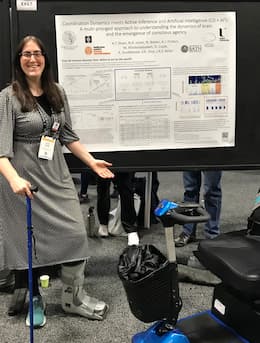
|
|
In collaboration with the groups of Damien Coyle, Karl Friston, and Viktor Jirsa, HBBL proposes a new interdisciplinary program of research - "Coordination Dynamics meets Active Inference and Artificial Intelligence (CD + AI2): A multi-pronged approach to understanding the dynamics of brain and the emergence of conscious agency."
View the poster here.
A Great Feat: Standing on one foot, HBBL member and Reseach Assistant Professor, Dr. Aliza Sloan explains the origins of purposeful action. |
|
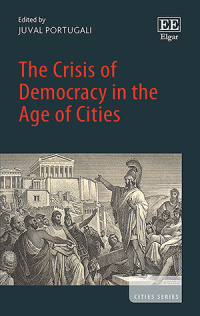
|
|
This insightful book examines the historical, contemporary, and future dimensions of cities and urbanism, and explores how 21st century life in cities contributes to the ongoing crisis of democracy.
"What’s wrong with democracy, why it is in crisis, goes much deeper than democracy itself. What’s wrong, fundamentally, is that people see their relations with themselves, others and the world as either-or. The result is that they are unable to tolerate dissent and acceptance of opposing views. This is what has to be fixed..."
Read Prof. Kelso's chapter, 'Democracy demands wisdom'.
|
|
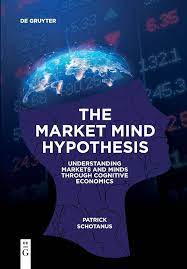
|
|
In this pioneering book, Patrick Schotanus explains that the dominant economics worldview which treats the economy as a machine, the market as an automaton, and its agents as robots leads to flawed thinking and faulty practices. Central to the Market Mind Hypothesis' psychophysical worldview is the fact that consumers, investors, and other participants are conscious beings and that their minds’ extension makes consciousness a reality in markets, exemplified by market mood.
The book argues that scholars and students of economics and finance as well as finance practitioners need to investigate―through cognitive economics, in collaboration with cognitive experts―the deep links between markets and minds to better understand both.
Read J.A. Scott Kelso's Intermezzo here.
|
|

|
|
Living things act with purpose. But where does purpose come from? How do humans make sense of their relation to the world and realize their ability to effect change? These fundamental questions of agency – acting with purpose – have perplexed some of the greatest minds in history. Using quantitative tools and principles of Coordination Dynamics, HBBL reveals groundbreaking insight into the origins of agency using an unusual and largely untapped source – human babies.
|
|
|
|
Click here for Press Release. Read the full article here. Click here to watch a baby in action!
|
|

|
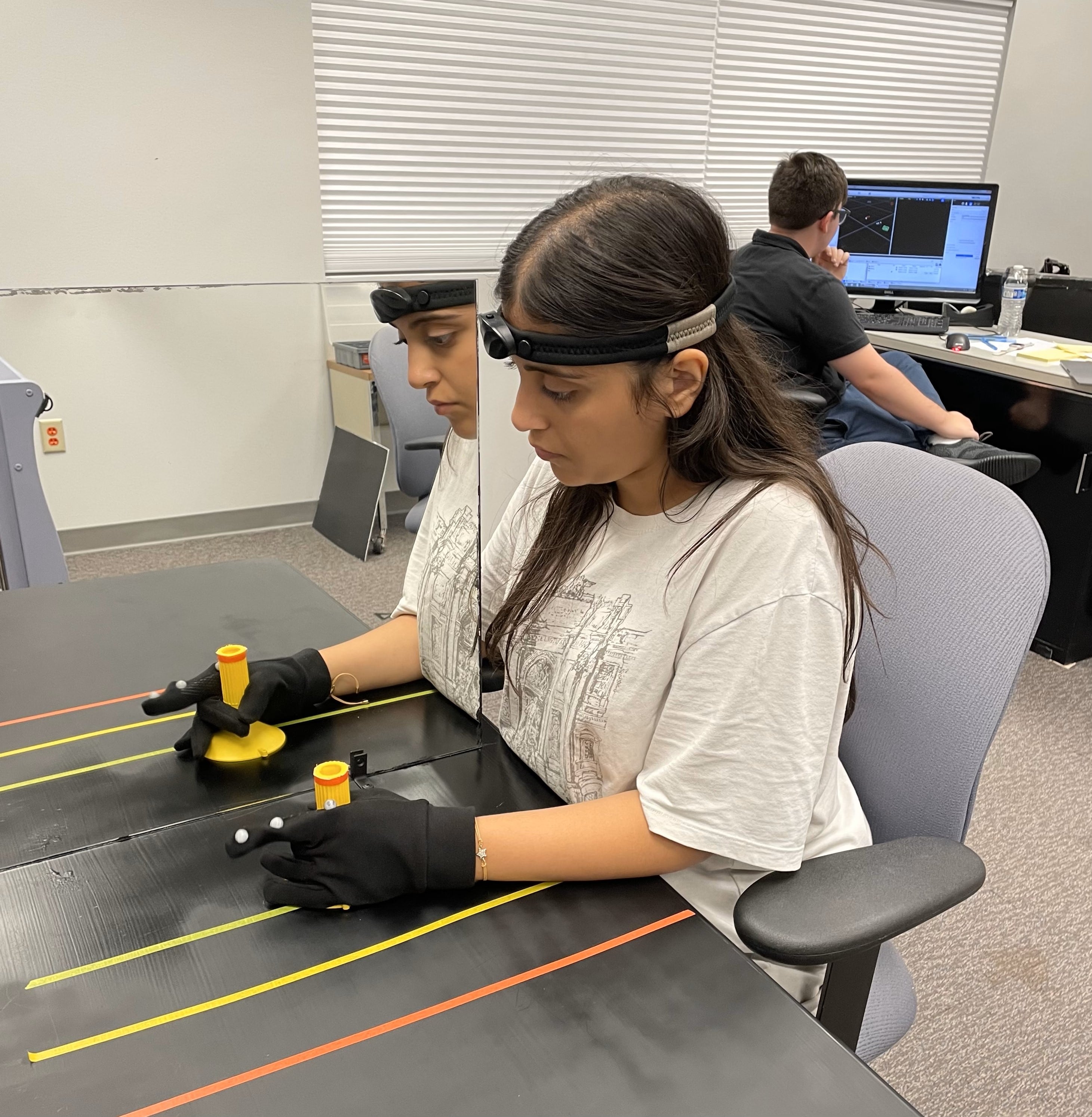
|
|
Led by FAU senior Carter Sale, HBBL's team of teen scientists are hard at work investigating "How Breaking Symmetry by Vision Infuences the Stability of Coordination." What happens to your coordinative abilities when there is a mismatch between what you see and what you feel? View Carter's poster here. |
|
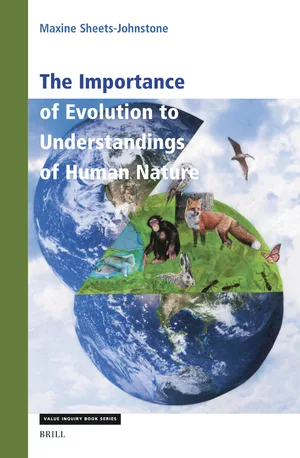
|
|
"Sheets-Johnstone’s methods, insights and inspiring writings await those who want to know. They are not for the faint-hearted or for those who seek to build careers on established paradigms. But for those who possess as Darwin did the creative power of not yet knowing, the fruits of “making the darkness conscious”, the “familiar strange”, as revealed here by Maxine Sheets-Johnstone and in her other works, are unimaginable. To future students, and to some old warriors, this is a gift.." -J.A.S. Kelso Read Foreword here.
|
|
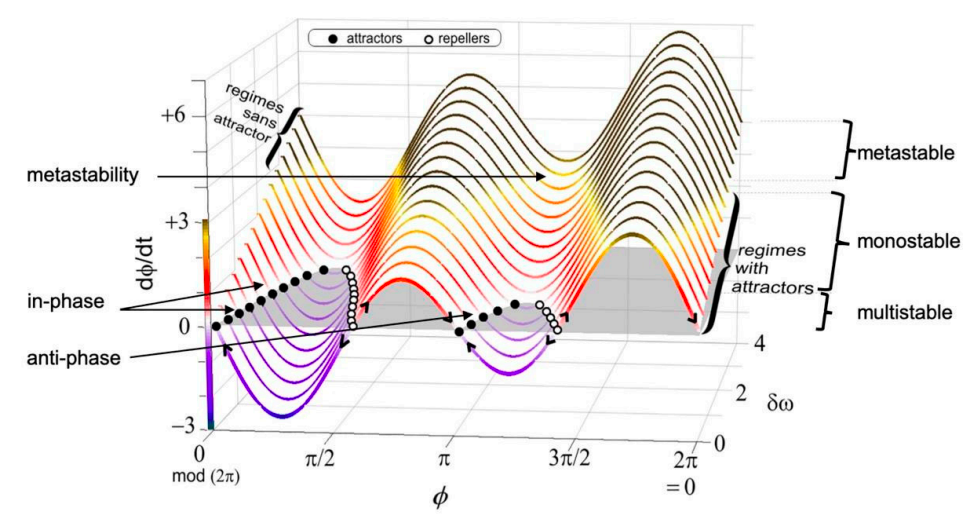
|
|
International Scientific Collaboration involving Universities in England, Spain, Portugal, Germany, Denmark, Australia, Canada, Ireland, and the US (FAU)—comprehensively reviews the past, present and future of the theory of metastability and its many applications in the neurosciences. For preprint see: https://www.preprints.org/manuscript/202307.1445/v1 |
|
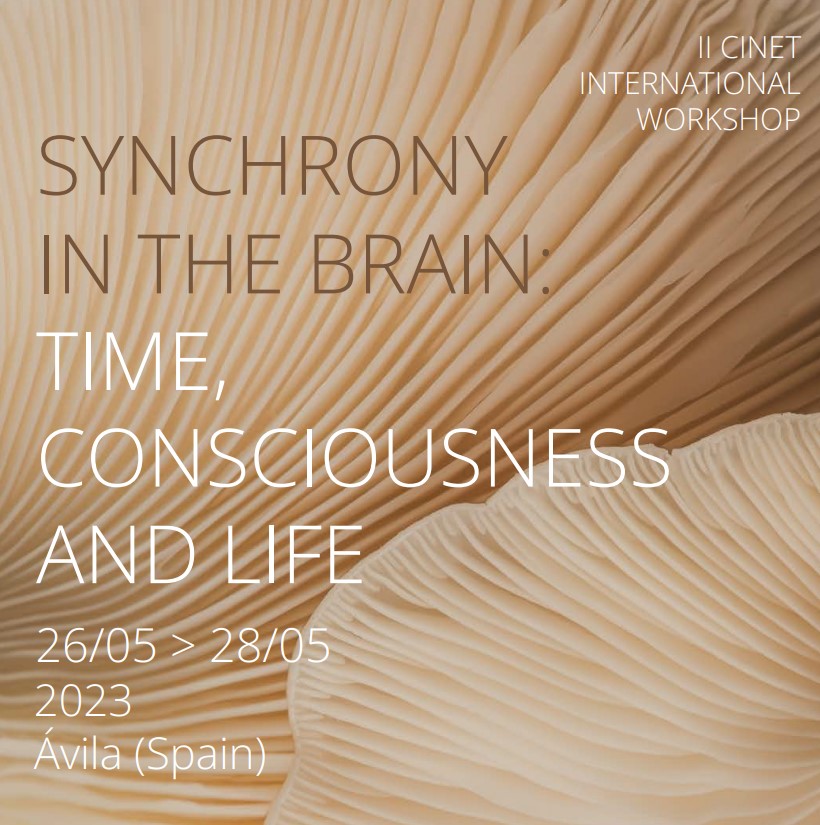
|
|
Funded by Fundacion Tatiana, the CINET International Workshop aims to promote the interdisciplinary dialogue on synchrony as an essential feature to understand the brain, its relationship with consciousness, and the development of mental life. (See program here).
|
|
|
|
|
|
|
Abstract Agency in the midst of action and inaction. Dynamical analysis of 3 month old infants in the baby~mobile paradigm reveals that agency emerges as a phase transition in a coupled dynamical system that spans the infant and the environment. Patterns of fluctuations prior to and following transitions reveal processes of exploration, discovery and control. Human infants realize they are agents through the joint process of stillness and actions that cause the world to change. These findings present a challenge to previous thinking and current modeling. |
|
|
|
|
|
Dually enrolled at FAU High School and FAU, Carter Sale has earned the FAU High Research Scholar of the Year Award for 2023! Since joining HBBL, Carter has investigated the dynamics underlying how 3-4-month old infants transition from spontaneous movement to goal-directed action. Carter presented these findings at local, national and international undergraduate research conferences (scroll down for details). Recently awarded FAU's competitive Summer Undergraduate Research Fellowship (SURF), including $4000 in funds, Carter is gearing up to explore the effects of visual perception on bimanual (hand-to-hand) coordination. Keep up the great work, Carter! |
|
|
|
|
Click here for the article.
|
|
|
Carter Sale, dually enrolled at FAU High School and FAU, presented new findings on the emergence of agency at St. Thomas University in Miami, FL. Open to all Florida undergraduate researchers, FURC is one of the nation's largest multi-disciplinary research conferences. "It went great," reflected Carter. "A lot of people were interested and took pictures." Check out the poster here. |
Quanta Magazine recently published an interesting article on the nature of brain function. Read J.A. Scott Kelso's Comment here.
|
|
|
SOAL at HBBL and the Theoretical Neurobiology team at University College of London's Wellcome Centre for Neuroimaging presented preliminary results of a collaborative effort to model the emergence of agency in human infants at Weizmann Institute's Active Sensing conference. Click here to view our poster. |
|
Left to right: Carter Sale, J. A. Scott Kelso, Aliza Sloan, Massoud Khodadadzadeh and his wife Aynaz Zarif |
HBBL happily welcomes Ulster University PhD candidate This month-long visit is funded by the UK Engineering and Physical Sciences Council though a Turing Artificial Intelligence Acceleration Fellowship (EP/V025724/1) and Global Research and Innovation Program (GRIP) grant. An expert in data science and artificial intelligence as applied to neurotechnology, Massoud is joining HBBL in exploring the application of AI toward understanding the coordinative origins of agency in infants. |
|
|
|
HBBL was delighted to receive a visit from Professors Pier-Giorgio Zanone and Sylvie Athènes of The Brain and Cognition Research Center (CNRS) in Toulouse and the Université Paul Sabatier. Pier and Sylvie are former postdoctoral fellows at The Center for Complex Systems. In addition to sharing their broad experience on matters of brain and cognition, including applied aspects such as selecting astronauts for the International Space Station, they provided a detailed and constructive critique of ongoing research in HBBL. Thank you Pier and Sylvie! |
|
HBBL members J. A. Scott Kelso (left) and Aliza Sloan (center) with Ryo Fujihira of University of Tokyo (right) |
|
Aliza Sloan (left) with CCS grad Dr. Mengsen Zhang (right) |
Dr. Aliza Sloan and Prof. J. A. Scott Kelso presented new findings on the dynamics of agentive discovery at SfN 2022.
Watch a video presentation of our poster here.
|
|
|
Dr. Aliza Sloan and her Co-Advisors Profs. Scott Kelso and Nancy Jones enjoy a moment prior to her 'hooding' at the Summer Commencement Ceremony for the Charles E. Schmidt College of Science on August 9, 2022 (photo courtesy Zach Greathouse). Aliza's doctoral research "Development of Infant Agency" was conducted in the Human Brain & Behavior Laboratory (HBBL) at the Center for Complex Systems. She is hoping to continue her work in the newly developed SOAL (Self-Organizing Agency Lab) https://www.ccs.fau.edu/hbblab/SOAL.php which will be devoted to understanding how agency emerges in human beings at both behavioral and neural levels of organization. |
|
|
|
What are the roots of intentional action? This program of research investigates how infants begin to make sense of their coordinative relationship with the world and realize their ability to effect change. Detailed measurement and careful probing of infant~environment coordination dynamics will reveal an array of phenotypic paths to conscious agency which depend on intrinsic infant factors, environmental affordances, and interaction parameters. Visit SOAL (Self-Organizing Agency Lab), a sub-division of HBBL, to learn more! |
|
|
|
|
J.A. Scott Kelso presents a sweeping review of central concepts, methods, and tools of coordination dynamics in 'On the coordination dynamics of (animate) moving bodies'. This latest paper posits ten tenets of the theory for those in the interdisciplinary field of complex systems interested in understanding the coordination of living things. Click here to read.
|
|
|
|
In situations where infants can control outcomes, could dynamical analysis be used to differentiate between levels of infant awareness? Can we catch a moment of agentive discovery? Click here for poster. Watch a baby in action here! |
|
|
|
Established by an Edinburgh-based international and multidisciplinary research group, the Market Mind Hypothesis Symposium applies a novel theory based on the thinking of Adam Smith to push the frontiers of how we understand markets and the minds they embody. Leading academics, investors and policymakers in the fields of economics, investing, and cognitive science gathered at Panmure House, the last and only remaining residence of Smith, to gain insight into improving markets, making investing more sustainable, increasing the effectiveness of public-policy and ultimately benefiting society. J.A. Scott Kelso explored the Market Mind Hypothesis within the framework of Coordination Dynamics. What kind of mind is the 'Market Mind'? Might infant minds inform characterization of market dynamics? Click here for abstract and here for video of invited talks by Karl Friston & J.A. Scott Kelso. Read more about the symposium here. Click here for agenda and here for symposium materials . |
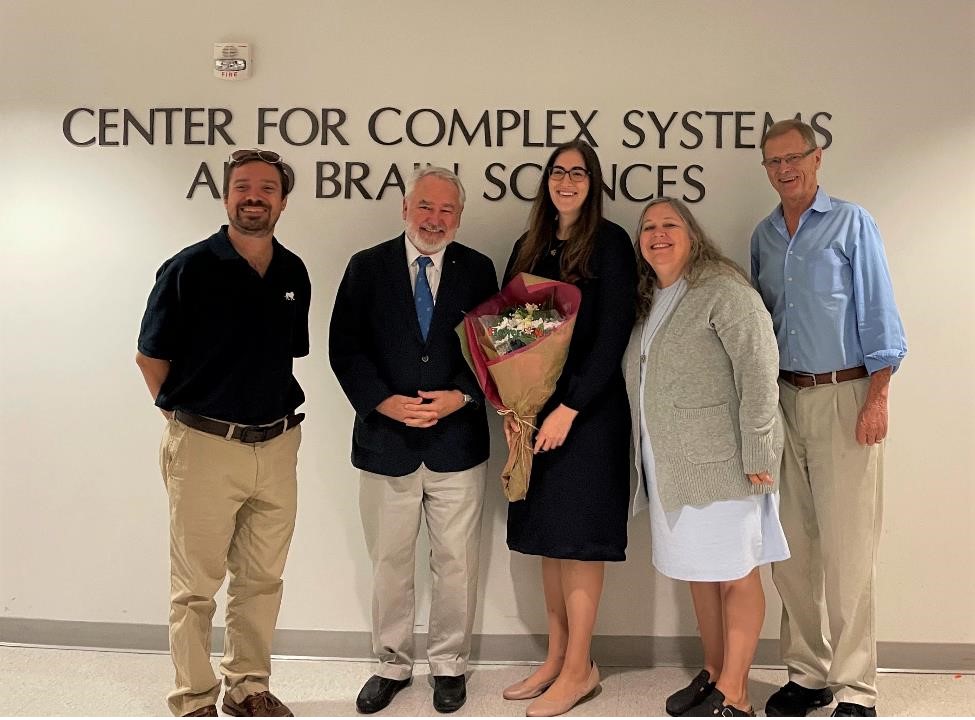 .
. |
||
|
HBBL member (soon-to-be Dr) Aliza Sloan successfully defended her Ph.D. Dissertation on May 12th, 2022, entitled “Development of Infant Agency“. Congratulations! |
|
|
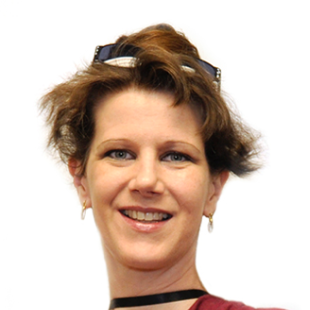
|
Tragically, Dr. Emmanuelle Tognoli passed away in the early hours of Saturday morning, April 23, 2022, after valiantly struggling to overcome a rare cancer which ultimately, and suddenly, took her life. Dr. Tognoli was a Research Professor in the Center for Complex Systems and Research Affiliate Professor in the Department of Physics. Her passing is a great loss for both programs. Emmanuelle was a very talented scientist, a respected colleague, and a beloved mentor and role model for her many students. She will be missed dearly by all who knew her. Click here for our memories of Emmanuelle. |
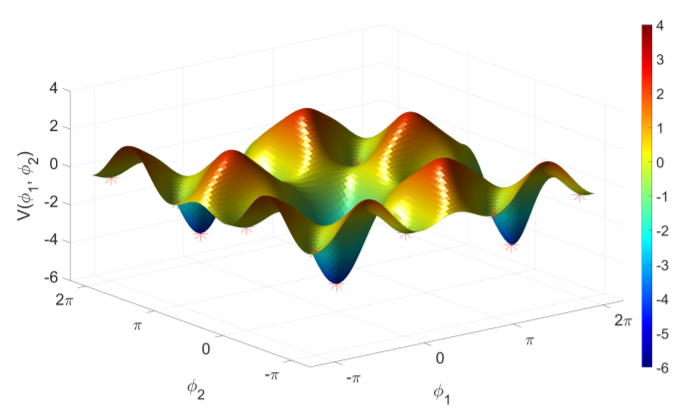
|
A new paper published in the Journal of Physics by HBBL members and associates Joseph McKinley, Mengsen Zheng, Alice Wead, Christine Williams, Emmanuelle Tognoli and Chris Beetle explores how the coordination dynamics of a pair of oscillators couplings can be augmented by virtue of their coupling to a third. Click here to read. |
The importance of complexity science was recently highlighted with the awarding of the 2021 Nobel Prize in Physics “For groundbreaking contributions to our understanding of complex physical systems.” Click here to revisit a 1990 APS Observer interview with Scott Kelso about the foundation of FAU's Center for Complex Systems - one of the first of its kind.
The Precision Convergence Webinar Series, co-hosted by The McGill Centre for the Convergence of Health and Economics and The Pittsburgh Supercomputing Center, catalyzes novel partnerships across sciences, sectors and jurisdictions to expand upon precision medicine to the many facets of precision targeting embedded in modern society.
J.A. Scott Kelso explained how the analysis of multiscale coordination dynamics can inform real-world transformation.
Click here to watch Dr. Kelso's lecture and panel discussion.
J.A. Scott Kelso delivers closing remarks regarding coordination dynamics at the Computational Neuroscience, Neurotechnology and Neuro-inspired Artificial Intelligence Autumn School.
Click here to learn more.
Click here for course overview.
J.A. Scott Kelso discussed behavior and the brain from the perspective of a dynamical theory of coordination at the Baltic-Nordic Summer School, in association with the Human Brain Project. His lecture was on the evening of Day 2, in Session with Profs. Viktor Jirsa (Marseille) and Sten Grillner (Karolinska Institutet).
Click here for course description and schedule.
An interview between the late Lisa Kimball, past president of the Plexus Institute, and J.A. Scott Kelso exploring agency, intention, leadership, paradox, the squiggle sense, the mysteries of the mind and the future of brain science.
Click here to read.
A retrospective of the HKB model recently featured in Biological Cybernetics in honor of the journal's 60th anniversary.
Click here to read.
Click here to watch.
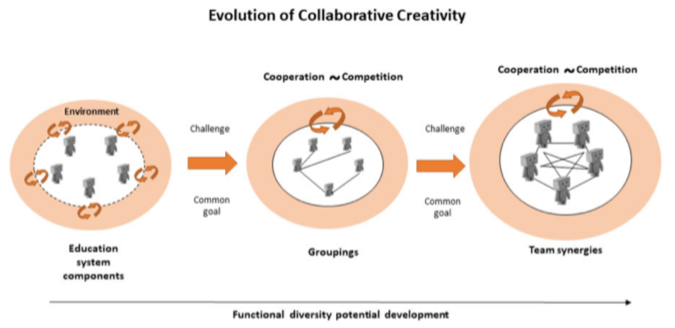
Click here to read more.
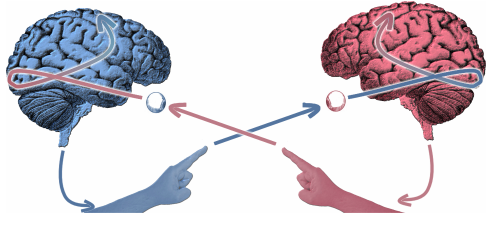
A new paper in Frontiers of Human Neuroscience.
Click here to read.
A new paper in Special Issue of Entropy on Information and Self-Organization II (Eds. H. Haken & J. Portugali).
Click here to read.
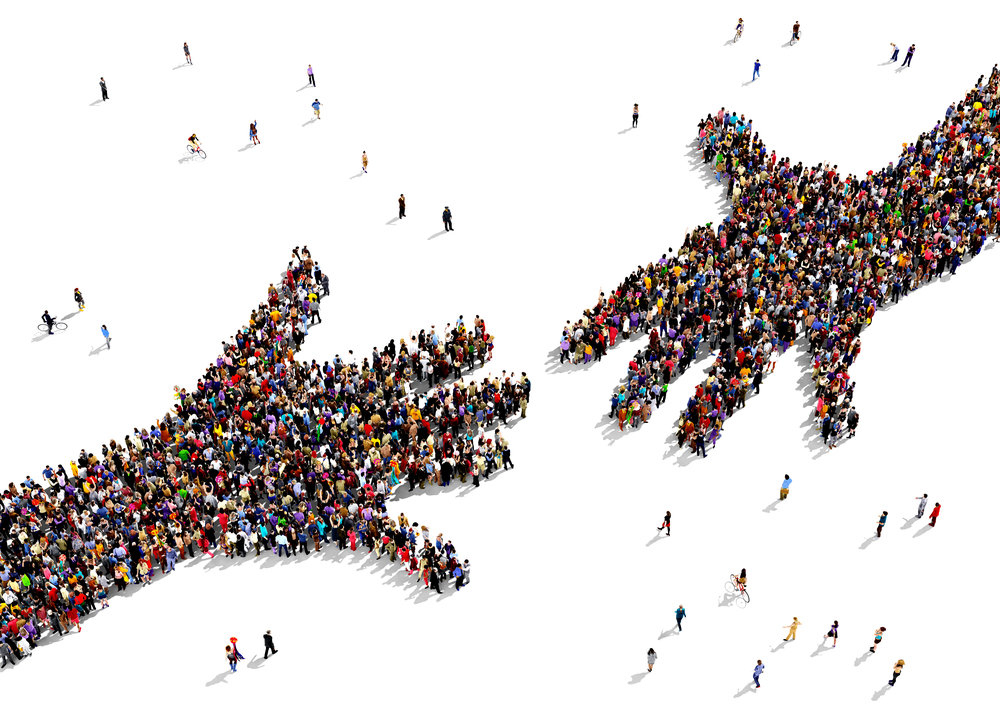
"We live in a polarized world these days. No matter the issue, whether race, gender, politics, religion, climate change, immigration, whatever, the either-or mode of thinking dominates...
But there is light at the end of the tunnel. It comes from the ‘new science of coordination’ called Coordination Dynamics and the philosophy and practices it gives rise to, called The Complementary Nature."
J.A. Scott Kelso explains how understanding the dynamics of polarization and instability could help society transcend 'either-or' and 'us vs. them' thinking.
Click here to read more.
"From Social Distancing to Social Harmony": Coordination finds a way.
"Design for Living": What do the structure and dynamics of the brain reveal about individuals and society at large?
"Time to Tildize": Opposing opposites ~ seeing the complementary nature of the world.
Click here to read more.
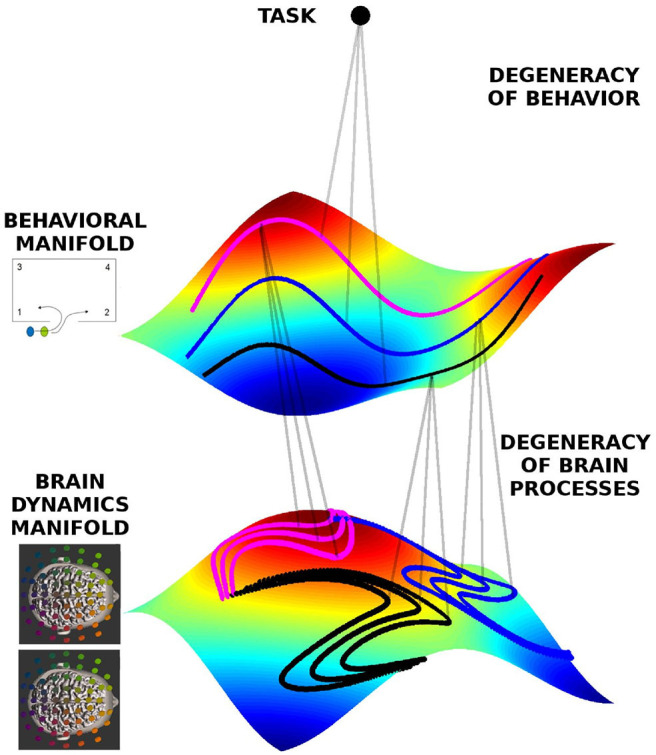
DOI: 10.13140/RG.2.2.16106.9568

DOI: 10.13140/RG.2.2.14848.66568
eBook of Abstracts is here: https://doi.org/10.5281/zenodo.4419178

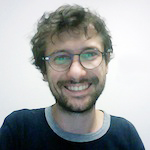
Center for Complex Systems alumnus and HBBL member Guillaume Dumas received a professorship at the Université de Montréal and will start his own lab in September 2020. The lab will be called the Precision Psychiatry and Social Physiology team and will be located in the Centre Hospitalier Universitaire Sainte-Justine, the site of the largest mother and child center in Canada. Click here for more on Guillaume.
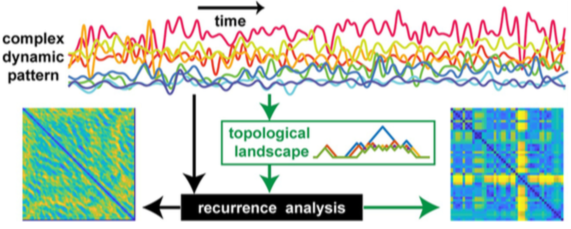
Mengsen Zhang, William Kalies, J. A. Scott Kelso & Emmanuelle Tognoli published an article in Journal of Neuroscience Methods on March 6th, 2020 entitled, "Topological portraits of multiscale coordination dynamics"
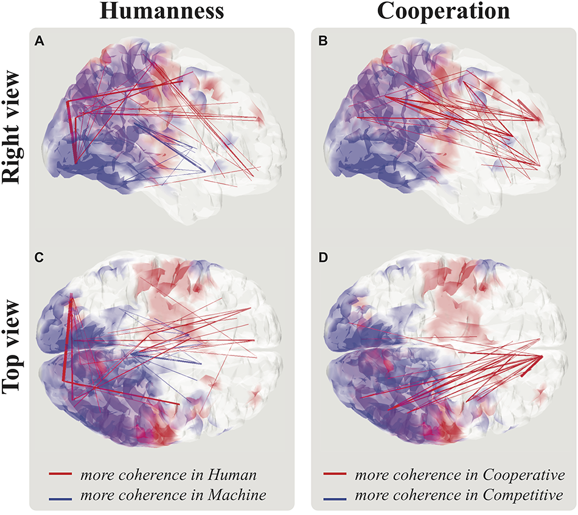
Guillaume Dumas, Quentin Moreau, Emmanuelle Tognoli & J. A. S Kelso published an article in Cerebral Cortex on December 23rd, 2019 entitled, "The Human Dynamic Clamp reveals the frontoparietal network linking real-time social coordination and cognition."
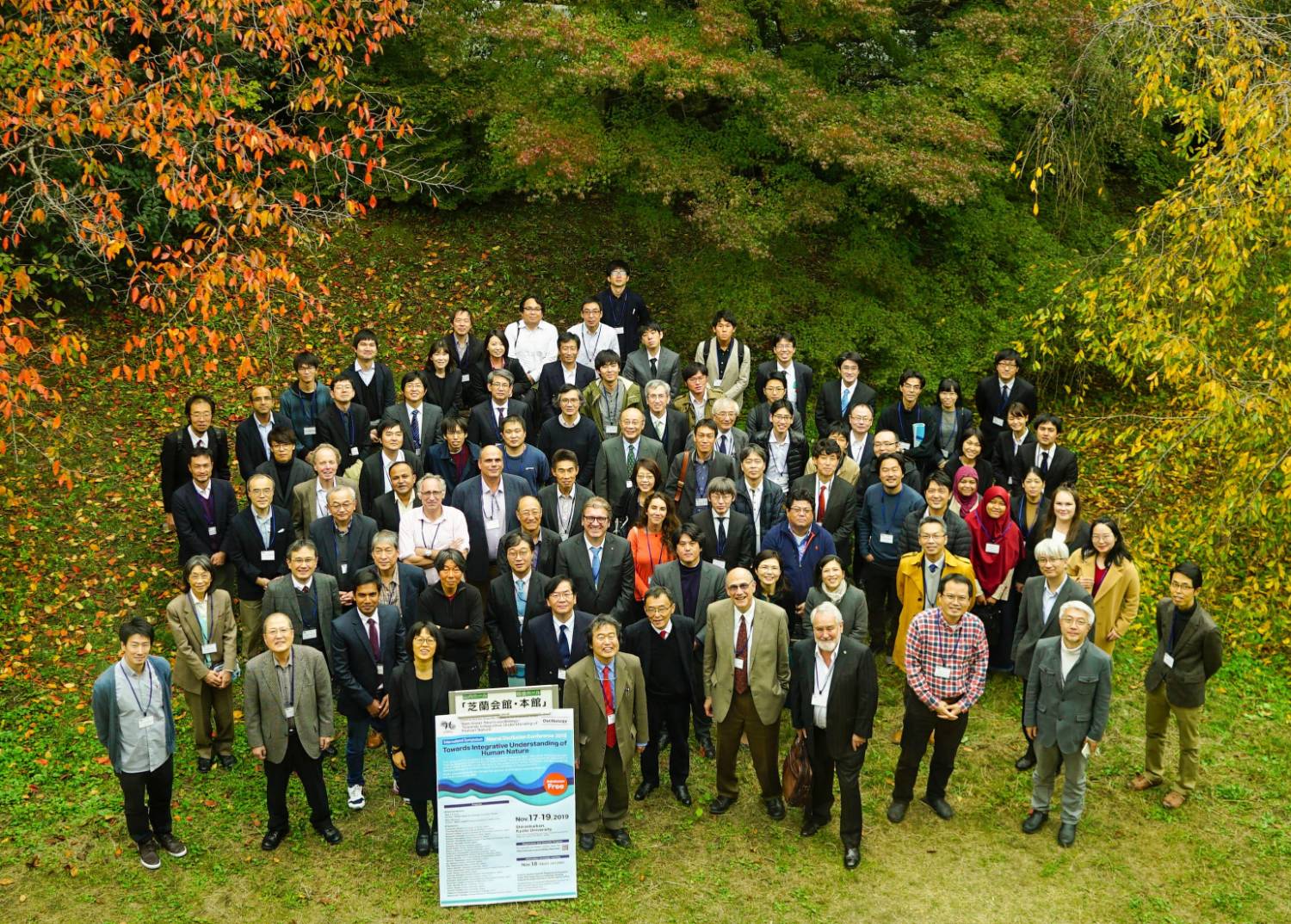
Dr. J. A. Scott Kelso gave a talk at the Neural Oscillation Conference 2019 in Kyoto, Japan (Nov. 17-19) entitled "Uniting the many and the few: Reconciling the Kuramoto and HKB models of biological coordination."
Click here to watch.
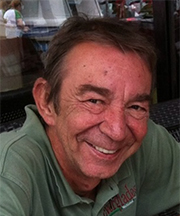
Sadly, Dr. Armin Fuchs passed away in the early hours of Saturday morning, June 29, 2019, after valiantly struggling to overcome cancer which ultimately, and suddenly, took his life. Dr. Fuchs was a Professor in the Center for Complex Systems and Department of Physics. His passing is a great loss for both programs. Those who knew him well knew him to be a gentleman, a good friend, and a very talented scientist and teacher will miss him dearly.
Click here for our memories of Armin.
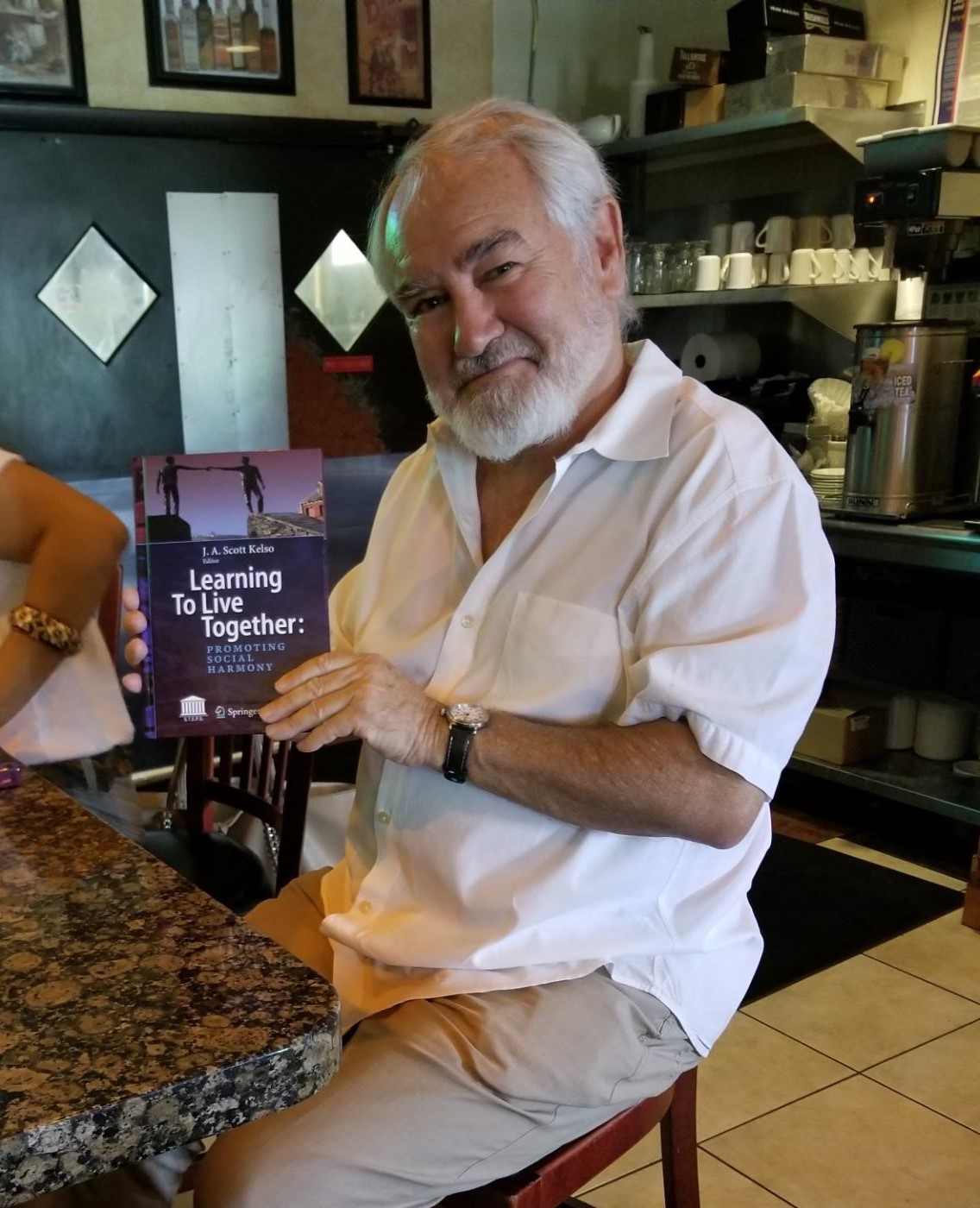 Dr. J. A. Scott Kelso’s (Ed.) new book, entitled “
Learning To Live Together: Promoting Social Harmony
“,
has recently been published in electronic and printed form.
Dr. J. A. Scott Kelso’s (Ed.) new book, entitled “
Learning To Live Together: Promoting Social Harmony
“,
has recently been published in electronic and printed form.
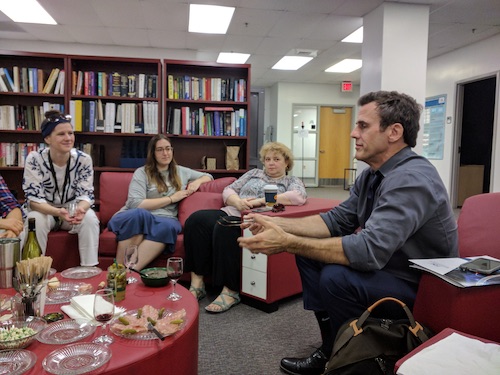 Dr. Montague visited the HBBL on April 10th, 2018, discussed dopamine, fancy recording techniques, and neuroscience in general.
Dr. Montague visited the HBBL on April 10th, 2018, discussed dopamine, fancy recording techniques, and neuroscience in general.
 HBBL members Mengsen Zhang, J. A. S. Kelso & Emmanuelle Tognoli recently published a new article on PLOS ONE, entitled “
Critical diversity: Divided or united states of social coordination
“.
HBBL members Mengsen Zhang, J. A. S. Kelso & Emmanuelle Tognoli recently published a new article on PLOS ONE, entitled “
Critical diversity: Divided or united states of social coordination
“.

Congratulations to former HBBLer and recent Ph.D. graduate Dr. Craig Nordham on the acceptance for publication (with Drs Tognoli, Fuchs & Kelso) of: “How interpersonal coordination affects individual behavior (and vice-versa): Experimental analysis and adaptive HKB model of social memory” in the journal Ecological Psychology.